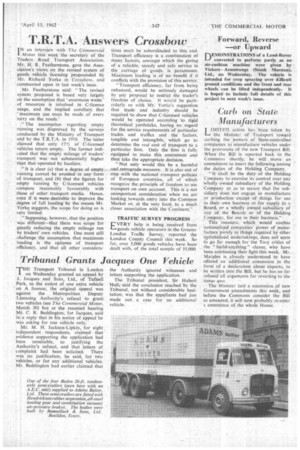T.R.T.A. Answers Crossbow IN an interview with The Commercial Motor
Page 35

If you've noticed an error in this article please click here to report it so we can fix it.
this week the secretary of the Traders Road Transport Association, Mr. H. R. Featherstone, gave the Association's views on the revised system of goods vehicle licensing propounded b'y Mr. Richard Yorke in Crossbow, and commented upon in last week's issue.
Mr. Featherstone said: "The revised system proposed is based very largely on the assumption that ` enormous waste' of resources is inVolved in C-licence usage, and the implied corollary that Maximum use must be made of every lorry on the roads.'
" The assumption regarding empty running was disproved by the surveys conducted by the Ministry of Transport and by the T.R.T.A. in 1958. The latter showed that only 17n of C-licensed vehicles return empty. The former indicated that the empty mileage or traders' transport was not substantially higher than that operated by hauliers.
"It is clear (a) that a degree of empty run sing cannot be avoided in any form of transport, and (b) that the figures for empty running by C-licensed vehicles compare reasonably favourably with those of other transport media. Hence. even if it were desirable to improve the degree of full loading by the means Mr. Yorke suggests, the scope for doing so is very limited.
"Supposing, however, that the position was different—that there was scope for greatly reducing the empty mileage run by traders' own vehicles. One must still challenge the assumption that maximum loading is the epitome of transport efficiency, and that all other considera lions must be subordinated to this end. Transport efficiency is a combination of many factors, amongst which the giving of a reliable, speedy and safe service in the carriage of goods, is paramount. Maximum loading is of no benefit if it conflicts with the provision of this service.
"Transport efficiency, far from being enhanced, would be seriously damaged by any proposal to restrict the trader's freedom of choice. It would be particularly so with Mr. Yorke's suggestion that trade and industry should be required to show that C-licensed vehicles would be operated according to rigid theoretical yardsticks, having no regard for the service requirements of particular trades and traffics and the factors. tangible and intangible, which go to determine the real cost of transport to a particular firm. Only the firm is fully equipped to make this assessment and then take the appropriate decision.
"Not only would this be a harmful and retrograde, measure.. It also out of step with the national transport policies of European countries, all of which recognize the principle of freedom to use transport on own account. This is a not unimportant consideration when we are looking towards entry into the Common Market or, it the very least, to a much closer association with the Continent."
TRAFFIC SURVEY PROGRESS ,
EVERY help is being received from goods vehicle operators in the Greater London Traffic Survey, • reported the London County Council this week. So far, over 5,000 goods vehicles have been dealt with, of the total sample of 35,000.




















































































































